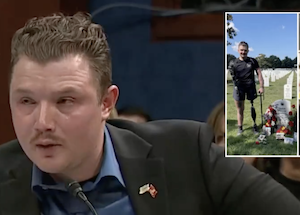Sgt. Tyler Vargas-Andrews testified to Congress that he had the suicide bomber in the crosshairs immediately before the blast, but was told by his superiors to stand down.
Sgt. Tyler Vargas-Andrews, a severely wounded U.S. Marine Corps sniper, provided compelling testimony before Congress regarding the chaotic U.S. withdrawal from Afghanistan, focusing on the tragic events at Kabul’s Abbey Gate on August 26, 2021.
During his testimony, Vargas-Andrews recounted how he and another Marine had identified a suicide bomber in the crowd outside Hamid Karzai International Airport but were denied permission to engage the threat.
Sgt. Tyler Vargas-Andrews, a U.S. Marine sniper, testifies to Congress that he was denied permission to shoot the suicide bomber in Afghanistan who killed 13 service members and over 170 civilians:
— KanekoaTheGreat (@KanekoaTheGreat) August 26, 2024
"Plain and simple, we were ignored. Our expertise was disregarded. No one was… pic.twitter.com/TEb7NuGgpF
This decision led to a devastating attack that killed 13 U.S. service members and over 170 Afghan civilians. Vargas-Andrews himself was severely injured in the blast, losing an arm and a leg, and has since undergone multiple surgeries.
His testimony highlighted a significant breakdown in communication and authority, where despite identifying the bomber, he was not allowed to take action due to unclear rules of engagement or lack of authorization from higher-ups.
This incident was part of much broader criticisms of the Biden administration’s handling of the Afghanistan withdrawal, described by Vargas-Andrews and others as a “catastrophe” marked by unpreparedness and a lack of accountability.
The emotional testimony not only shed light on the personal and immediate impact of the withdrawal but also raised questions about the broader strategic and tactical decisions made during the evacuation process.
Vargas-Andrews’s account has spurred further investigations and calls for accountability from both military and political leaders involved in the decision-making process during the withdrawal. It is a damning indictment of the incompetence at the C-in-C level.
Biden spokesman John Kirby responds to criticism of the botched Afghanistan withdrawal — including from the Gold Star mom of fallen Staff Sgt. Taylor Hoover:
— RNC Research (@RNCResearch) August 17, 2023
"There wasn't much that could've been done to prevent that attack from coming, as tragic as it was." pic.twitter.com/vMfmuDuxvj
